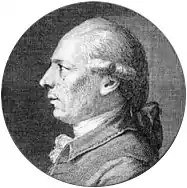Persée (Philidor)
Persée (Perseus) is an opera by the French composer François-André Danican Philidor first performed at the Académie Royale de Musique, Paris (the Paris Opera) on 24 October 1780. It takes the form of a tragédie lyrique in three acts. The text is a reworking, by Jean-François Marmontel, of a libretto by Philippe Quinault, originally set by Jean-Baptiste Lully in 1682. Philidor's version was not a success.
| Persée | |
|---|---|
| Tragédie lyrique by François-André Danican Philidor | |
 Portrait of Philidor, London, 1777 | |
| Librettist | Jean-François Marmontel |
| Language | French |
| Based on | Philippe Quinault's libretto for Persée |
| Premiere | |
Roles
| Role | Voice type | Premiere cast |
|---|---|---|
| Céphée (Cepheus), King of Ethiopia | basse-taille (bass-baritone) | Moreau |
| Cassiope (Cassiopeia), wife of Céphée | soprano | Françoise-Claude-Marie-Rosalie Campagne (called Mlle Duplant) |
| Andromède (Andromeda), daughter of Céphée and Cassiope | soprano | Rosalie Levasseur |
| Persée (Perseus), son of Jupiter | haute-contre | Joseph Legros |
| Phinée, prince of Ethiopia | bass-baritone | Henri Larrivée |
| Mercure (the god Mercury) | tenor | Étienne Lainez |
| Méduse Medusa, a Gorgon | soprano | Mlle Duranci (also spelled Durancy)[1] |
| Euryale, a Gorgon (travesti) | haute-contre | Jean-Joseph Rousseau[2] |
| Stenone, a Gorgon (travesti) | ? | Perré |
| Orcas, an Ethiopian | bass-baritone | Auguste-Athanase (Augustin) Chéron |
| Proténor, an Ethiopian | taille (bari-tenor) | François Laïs (or Lays) |
| Un cyclope (a cyclops) | bass-baritone | Durand |
| A Triton | ? | Perré |
| Vénus (the goddess Venus) | soprano | Châteauvieux |
| Une nymphe guerrière (a warrior nymph) | soprano | Suzanne Joinville |
Notes
- Stage name of Madeleine-Céleste Fieuzal (or Fieusacq) de Frossac
- Sources traditionally report only the initial letter (J.) of this singer's name; full details, however, can be found in "Organico dei fratelli a talento della Loggia parigina di Saint-Jean d'Écosse du Contrat Social (1773-89)" (list of the members of this Masonic lodge), reported as an Appendix in Zeffiro Ciuffoletti and Sergio Moravia (eds), La Massoneria. La storia, gli uomini, le idee, Milan, Mondadori, 2004, ISBN 978-8804536468 (in Italian).
Sources
- (in French) Félix Clément and Pierre Larousse Dictionnaire des Opéras, p.525.
- (in French) Original libretto on Gallica BNF
This article is issued from Wikipedia. The text is licensed under Creative Commons - Attribution - Sharealike. Additional terms may apply for the media files.